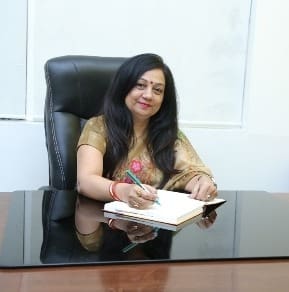By Ms. Renu Sharma
Principal
Indirapuram Public School, Pratap Vihar, Ghaziabad

It is obvious that NEP- 2020 is derived by using very scientific methods, applying logic, data analysis and Neural Science coming into the picture as per age appropriateness.
All the stages of learning are very well designed. The pedagogy and the curricular framework for the foundational stage (age 3 – 8) is planned in a very unstructured manner i.e. different for each child as the trajectory of each child’s brain development at this stage is different and children are perceptive during this stage.
In the preparatory stage (9 – 11years) more structured linear curriculum is designed as learning has to be conceptual at this stage. Three years of Middle stage (12-14) includes the introduction of more abstract concepts in each subject hence the learning is prescriptive. The four years of the second stage would comprise of multidisciplinary study with more focus on Vocational subjects.
Most of the recommendations of NEP – 2020 and derived from the Kothari Commission 1968 recommendation and old Education Policies.
The policy is a very ambitious and progressive one however the key here is good implementation and execution.
There would be substantial execution challenges both quantitative and qualitative.NEP – 2020 intends to bring 2 crore children currently not in schools, back into the mainstream. Accomplishing this, over 15 years requires setting up hundreds of schools every month which certainly would require a huge amount of investment and Human resources and these COVID times would make the funding furthermore challenging.
In the last 70 years of independence, India had used about 3% of its GDP on education and related infrastructure, which is relatively low when compared to many small European countries such as Norway, Denmark, Sweden, etc. But now as per NEP – 2020, 6 – 7% of countries GDP would be spent on education which I feel is not yet comparable to the countries which are really doing well in the field of education.
China changed its education policy in 1970 and invested not only in TISA (Technology Industry Science & Agriculture) but also focused on giving education to all at free of cost. In India to do something of this kind would be a challenge.
The three-language formula is focusing lots of criticism particularly from South Indian states such as Tamil Nadu which is already following a ‘Two language’ formula and is quite successful too. Singapore is another example of a successful two-language Model.
Countries like Israel have Research and Innovation departments directly under PMO. The government also funds all the work done by the students in the said field and that is the reason why such a small country has 14 Nobel laureates. In India to promote creative innovations and out of the box thinking the education system needs to shift its focus from a rigid competition and marks based to a system which is based on awaking of mind.
The NEP – 2020 aspires to a sweeping structural redesign of the curriculum which is a progressive and welcome step but this would require mindset shifts on the part of teachers and parents. Teachers’ training would be a great challenge.
NEP – 2020 talks about vocationalization and skill subjects in a big way which is a progressive thought however parents in India have a very stereotyped mindset where the academic subjects are given always more importance hence treating skill subjects with equal importance and respect would be a challenge.
NEP – 2020 talks about flexibility in course subjects with no hard separation among curricular, extracurricular, academic and skill subjects. However, as far as schools are concerned there are many limitations related to Infrastructure, Human Resources, and other resources that would pose obstructions in the path of fulfilling these aims. Also, can we do away with the stream system when universities still continue with specific fixed eligibility criteria for various courses? is a big question.


